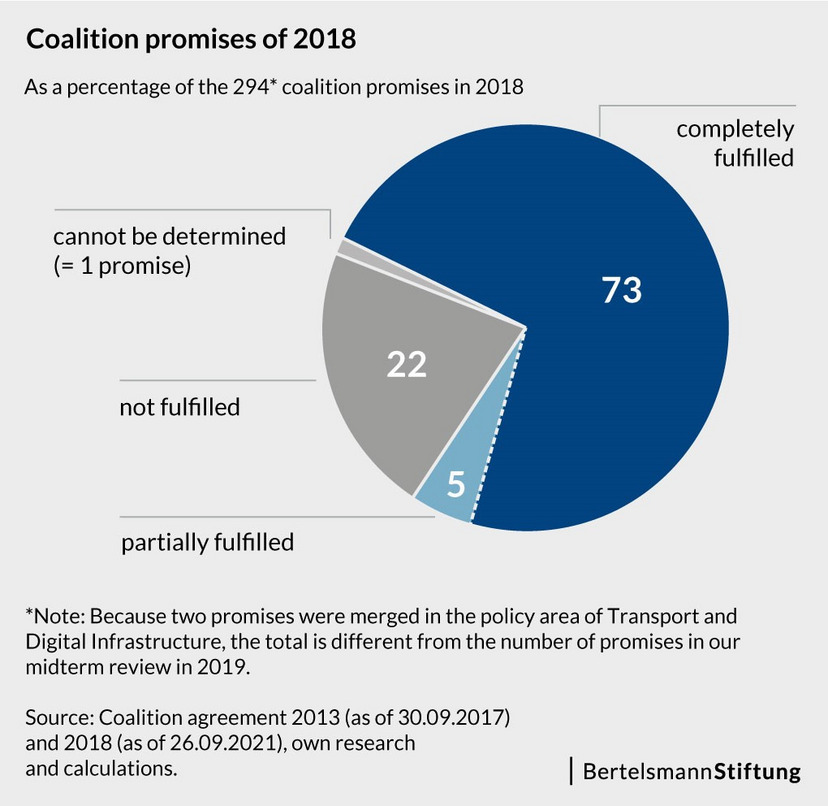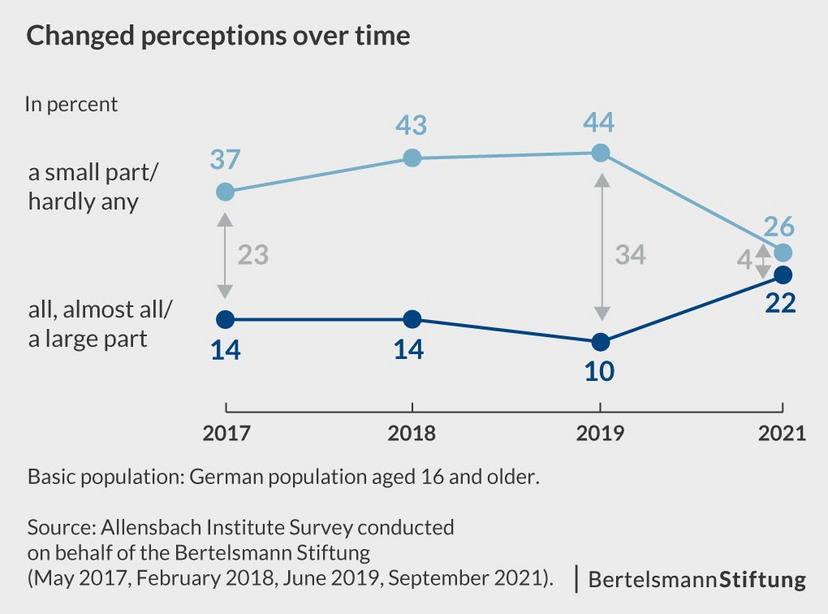With a total of 294 promises, the 2018 coalition agreement contains almost 60 percent more individual promises than the 188 included in the 2013 coalition agreement. Of these 294 promises, the grand coalition had fully implemented 214 (73 percent) by the end of the legislative period, while another 15 promises (5 percent) were partially fulfilled. This means that the current coalition’s final balance sheet is somewhat better than that of the previous government, with a significantly higher proportion of fully implemented promises. The last government implemented 64 percent of its pledges fully, and 15 percent partially. Nevertheless, even in this legislative period, 64 individual promises remained unfulfilled, more than one fifth of the total. This is not a small number. However, both in the national and in the international context this makes for a comparatively high implementation rate and a very good overall picture. The government has therefore largely done what it promised.

© Roman - stock.adobe.com
Promises kept – a final balance sheet for the German grand coalition, 2018–21
Parties and governments are better than their reputation. That includes Germany’s grand coalition: out of a total of 294 promises included in the 2018 coalition agreement, almost 80 percent were realized in full or in part. This is also reflected in surveys showing that people have significantly more trust in politicians to implement coalition agreements. For the new government, too, this represents an opportunity.
Content
This is also reflected in significantly improved levels of public trust: 22 percent of people now believe that “all, almost all” or “a large part” of coalition promises are kept, and another 39 percent think that at least “roughly half” are kept. The gap between optimists and skeptics has thus almost closed. Only four percentage points more of those surveyed are still skeptical about fulfillment (26 percent), and there are now almost as many optimists (22 percent).
Negotiating good coalition agreements with concrete policy promises is therefore worthwhile. When they are implemented, there is a greater likelihood of trust, an increased sense of commitment, and a new level of credibility. Politics may not only be about implementing coalition agreements, but these agreements are an important and promising instrument for commitment and accountability, also for voters. The SPD/Green/FDP exploratory paper argues that no one should “be left out in the cold.” In the same vein, the trust which voters place in government pledges should not be left to wither away, but should ideally grow to reach new horizons.
Outlook: The ‘traffic light’ negotiations in 2021
As shown by the rising levels of confidence in the government to carry out its plans, it is possible to create trust, and good coalition agreements with verifiable and fulfilled promises can contribute to this. With a view to the current coalition negotiations between the SPD, the Greens and the FDP, this means that while coalition negotiations may be difficult and strenuous, they are worth it.
The results of this study give rise to the following three exemplary recommendations:
1. Agreements can and should be concrete and binding. The coalition’s goals and plans should be verifiable, and rhetoric and vague promises should be avoided as far as possible. This creates commitment and is the only way to determine whether implementation has been successful. What cannot be agreed does not belong in an “agreement.” Platitudes are distracting, obscuring the essentials and leading to disputes further down the road, which then dominate perceptions of implementation.
2. Despite this need for policy promises with concrete intentions, an overall narrative is also necessary. The individual promises in the agreement should be elucidated by a focused overarching narrative includingclear core messages and guiding principles. These do not arise automatically but are a task and an achievement in themselves. This requires a separate working group to accompany, reflect on and explain the entire negotiation process. The exploratory paper by the SPD, Greens and FDP was a good first step in this direction. But more is needed for the coalition agreement.
3. Transparency generates trust. When promises are put into action, this should therefore be documented, published and explained transparently. That also – and especially – applies to individual cases in which non-fulfillment may be justified by “good” reasons. These reasons must be stated and explained so that they can be accepted and believed. An interim balance sheet at the halfway point of the legislative period has proven its worth. Ongoing coalition tracking that citizens can access at any time would be desirable. In politics as in accountancy, profits and losses can only be accounted for credibly through transparent and honest bookkeeping of promises.





